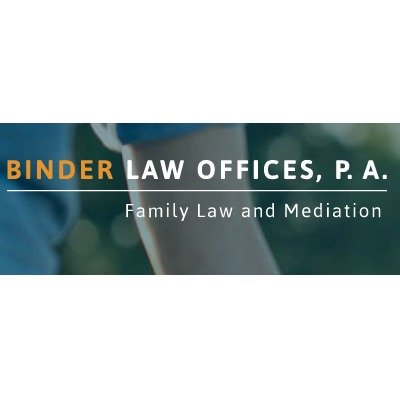Best Child Custody Lawyers in Minnesota
Share your needs with us, get contacted by law firms.
Free. Takes 2 min.
Free Guide to Hiring a Family Lawyer
Or refine your search by selecting a city:
List of the best lawyers in Minnesota, United States
About Child Custody Law in Minnesota, United States
Child custody law in Minnesota governs how decisions are made about where a child will live and how major life choices for the child will be handled when parents separate or divorce. Minnesota law puts the child's best interests at the forefront of any custody determination. Custody arrangements can be reached through agreement between the parents, but if they are unable to agree, a family court judge will make decisions on their behalf. There are two primary components in child custody: legal custody, which concerns decisions about the child's upbringing, and physical custody, which relates to where the child lives.
Why You May Need a Lawyer
Navigating child custody cases can be complex and emotional. You may need the help of a lawyer in situations where:
- Parents disagree on custody arrangements.
- One parent seeks to relocate with the child to another city or state.
- There are concerns about the child’s safety or well-being with one parent.
- Cases involve allegations of abuse or neglect.
- Non-parents (such as grandparents or guardians) seek custody or visitation rights.
- One parent is not following an existing custody order.
- Modifying an established custody order is necessary due to changed circumstances.
A lawyer can help you understand your rights and responsibilities, represent you in court, and ensure that custody agreements serve the best interests of the child.
Local Laws Overview
Minnesota operates under specific statutes addressing child custody, found in Chapter 518 of the Minnesota Statutes. Custody can be legal (decision making) or physical (where the child lives). Courts favor arrangements that encourage both parents to be involved whenever possible.
Minnesota law outlines factors a judge must consider when deciding what is in the "best interests of the child," such as the wishes of the child and the parents, the child's primary caretaker, the child's relationship with each parent, the child's adjustment to home and community, and the mental and physical health of all parties.
Minnesota recognizes both joint and sole custody. In joint legal custody, both parents share decision-making responsibilities. In joint physical custody, the child splits time living with each parent, though the split may not always be equal. Sole custody means one parent is primarily responsible.
Unlike some states, the law does not presume joint physical custody is best, but it is an option courts seriously consider. In cases of domestic abuse or other serious concerns, custody arrangements may be structured to protect the child.
Frequently Asked Questions
What is the difference between legal custody and physical custody?
Legal custody is the right to make important decisions about the child’s upbringing, such as education, healthcare, and religion. Physical custody refers to where the child lives on a daily basis.
Can both parents share custody in Minnesota?
Yes, Minnesota courts can award joint legal custody, joint physical custody, or both if it is in the child's best interests.
What do Minnesota courts consider when determining custody?
Courts review several factors, focusing on what arrangement is best for the child. These include the child's needs, relationships, and any history of domestic abuse, among others.
Can a child choose which parent to live with?
Minnesota courts may consider the child’s preference, especially for older children, but it is only one of many factors and not the deciding factor.
What happens if one parent violates a custody order?
Violating a custody order may result in legal consequences. The affected parent can file a motion in court to enforce or modify the existing order.
How does relocation affect child custody?
If a parent wishes to move with a child to another state or a significant distance away, they generally must obtain the other parent's consent or a court order permitting the move.
Can grandparents or other relatives get custody in Minnesota?
In certain situations, non-parents such as grandparents can seek custody or visitation, though it is generally more challenging than for parents.
Is mediation required for child custody disputes?
Minnesota courts often encourage mediation to help parents reach agreement without a trial, though it may not be required in every case.
How can custody arrangements be changed?
Custody orders can be modified if there is a significant change in circumstances and the change is in the child’s best interest. This typically requires court approval.
What is a parenting plan?
A parenting plan is a document created by the parents (and sometimes the court) outlining how they will share responsibilities, including schedules, decision making, and methods for conflict resolution.
Additional Resources
- Minnesota Judicial Branch Family Law Self-Help Center
- Minnesota Department of Human Services, Child Support Division
- Legal Aid organizations in Minnesota
- Minnesota State Bar Association’s Lawyer Referral Service
- County family court services and local court administrators
- Domestic violence advocacy groups, if relevant to your situation
Next Steps
If you are facing a child custody matter in Minnesota, it is important to gather all relevant documents, such as past court orders, communication records, and details about your relationship with your child. Consider reaching out to a qualified local family law attorney who can evaluate your specific situation and help you understand your options. Legal self-help centers and court staff may also provide general information and guidance. Remember that prompt action helps ensure the child's best interests are protected and your rights are upheld throughout the process.
Lawzana helps you find the best lawyers and law firms in Minnesota through a curated and pre-screened list of qualified legal professionals. Our platform offers rankings and detailed profiles of attorneys and law firms, allowing you to compare based on practice areas, including Child Custody, experience, and client feedback.
Each profile includes a description of the firm's areas of practice, client reviews, team members and partners, year of establishment, spoken languages, office locations, contact information, social media presence, and any published articles or resources. Most firms on our platform speak English and are experienced in both local and international legal matters.
Get a quote from top-rated law firms in Minnesota, United States — quickly, securely, and without unnecessary hassle.
Disclaimer:
The information provided on this page is for general informational purposes only and does not constitute legal advice. While we strive to ensure the accuracy and relevance of the content, legal information may change over time, and interpretations of the law can vary. You should always consult with a qualified legal professional for advice specific to your situation.
We disclaim all liability for actions taken or not taken based on the content of this page. If you believe any information is incorrect or outdated, please contact us, and we will review and update it where appropriate.
Browse child custody law firms by city in Minnesota
Refine your search by selecting a city.













